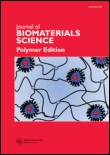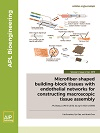
Advanced NanoBiomed Research
Scope & Guideline
Catalyzing Discoveries in Nanobiotechnology
Introduction
Aims and Scopes
- Nanomaterials for Drug Delivery:
Research related to the design and application of nanomaterials as drug delivery systems, enhancing the efficacy and targeting of therapeutic agents. - Tissue Engineering and Regenerative Medicine:
Studies aimed at developing scaffolds and biomaterials for tissue regeneration, focusing on the interaction between cells and engineered materials. - Biosensing and Diagnostics:
Innovations in biosensing technologies utilizing nanomaterials for the detection of biomarkers, pathogens, and diseases. - Cancer Therapy and Immunotherapy:
Research on nanotechnology applications in cancer treatment, including targeted therapy, immunotherapy, and theranostics. - Biocompatible Materials:
Development of biocompatible materials that can interact safely with biological systems for various therapeutic applications. - Microfluidics and Organ-on-a-Chip Technologies:
Application of microfluidic systems for biological assays, drug testing, and modeling of human organs for biomedical research.
Trending and Emerging
- Smart and Responsive Nanocarriers:
Increased research on stimuli-responsive nanocarriers for targeted and controlled drug delivery, which allows for enhanced therapeutic effects and reduced side effects. - Biomimetic Materials:
A growing focus on materials that mimic biological systems, enhancing compatibility and functionality in biomedical applications. - Nanotechnology in Regenerative Medicine:
Emerging studies on the application of nanotechnology for regenerative medicine, including stem cell therapy and tissue repair mechanisms. - Machine Learning and AI in Nanomedicine:
The integration of machine learning and artificial intelligence to predict the behavior of nanomaterials and improve drug design processes is gaining traction. - Multi-Modal Therapeutic Approaches:
Research is increasingly focusing on combination therapies that integrate multiple modalities, including photothermal, photodynamic, and immunotherapy, to enhance cancer treatment outcomes.
Declining or Waning
- Traditional Drug Formulations:
Research focusing on conventional drug formulations and delivery methods seems to be less prevalent, with a shift towards more innovative nanotechnology-based approaches. - Basic Nanomaterial Properties:
Studies that primarily investigate the fundamental properties of nanomaterials without clear biomedical applications are becoming less common. - In Vivo Animal Studies:
There is a noticeable decrease in the number of publications emphasizing in vivo animal studies, as the focus shifts towards more advanced in vitro models and organ-on-a-chip technologies.
Similar Journals

JOURNAL OF BIOMATERIALS SCIENCE-POLYMER EDITION
Bridging science and application in polymer biomaterials.JOURNAL OF BIOMATERIALS SCIENCE-POLYMER EDITION, published by Taylor & Francis Ltd, is a distinguished scholarly journal dedicated to the exploration of biomaterials and their applications in various fields such as bioengineering, biomedical engineering, and biophysics. With an ISSN of 0920-5063 and an E-ISSN of 1568-5624, this journal offers a platform for researchers and professionals to share innovative findings and methodologies that advance the science of polymer-based biomaterials. The journal's impact within the academic community is underscored by its notable Scopus rankings, including a Q2 status in both Biomedical Engineering and Biophysics as of 2023, reflecting its significant contribution to advancing knowledge and practice in these fields. The scope of the journal spans from fundamental research to applications in medical devices and regenerative medicine, ensuring comprehensive coverage of the latest trends and breakthroughs. Although it does not currently offer open access options, the journal remains a pivotal resource for students, researchers, and professionals committed to the development and application of biomaterials in healthcare. For further details, the journal is based in Abingdon, United Kingdom, at 2-4 Park Square, Milton Park, OX14 4RN.

Materials Today Bio
Unlocking innovative solutions at the intersection of materials and biology.Materials Today Bio, published by Elsevier, is an esteemed open-access journal dedicated to advancing the fields of bioengineering, biomaterials, and biomedical engineering. Since its inception in 2019, this journal has quickly made a name for itself, currently ranked Q1 in multiple categories including Bioengineering, Biomaterials, and Biotechnology, reflecting its exceptional quality and relevance in the rapidly evolving landscape of bio-related sciences. With an impressive Scopus ranking positioning it in the top 25% of its categories, Materials Today Bio provides a vital platform for researchers and professionals to share cutting-edge discoveries and innovative applications that bridge the gap between materials science and biological studies. Accessible to a global audience, this journal not only fosters collaboration among the scientific community but also aims to highlight significant advancements in cell and molecular biology, making it an indispensable resource for students and seasoned experts alike. The journal's commitment to open access since 2019 underscores its dedication to disseminating knowledge widely, ensuring that crucial findings reach those who can benefit from them the most.

Frontiers in Bioengineering and Biotechnology
Driving Breakthroughs in Biomedical Engineering and BeyondFrontiers in Bioengineering and Biotechnology, published by FRONTIERS MEDIA SA in Switzerland, stands as a leading platform for innovative research and developments in the fields of bioengineering and biotechnology. Since its inception in 2013, this Open Access journal has garnered significant recognition, reflected in its impressive category rankings: Q1 in Biomedical Engineering and Q2 in Bioengineering, Biotechnology, and Histology for 2023. With a focus on fostering collaboration and knowledge sharing, it aims to provide researchers, professionals, and students with access to pioneering studies that push the boundaries of science and technology. The journal, which is indexed in prominent databases, boasts high visibility and impact, evidenced by its impressive rankings across various categories in Scopus. As it continues to converge from 2013 to 2024, Frontiers in Bioengineering and Biotechnology is dedicated to shaping the discourse in its field and promoting advancements that have the potential to transform healthcare and environmental sustainability.

BIOMEDICAL MICRODEVICES
Leading the Charge in Microdevice InnovationBIOMEDICAL MICRODEVICES is a leading journal published by Springer that focuses on the innovative field of microdevices within biomedical engineering. With an ISSN of 1387-2176 and an E-ISSN of 1572-8781, BIOMEDICAL MICRODEVICES offers a prestigious platform for researchers to disseminate their findings from 1998 to 2024, demonstrating a long-standing commitment to advancing knowledge in this critical area. The journal is recognized for its significant contributions, boasting a Q2 ranking in Biomedical Engineering and Nanoscience and Nanotechnology, and a Q3 rank in Molecular Biology. Renowned for its rigorous peer-review process, it is positioned within the top 30% of its field according to Scopus rankings, making it a valuable resource for researchers and practitioners alike. Though it operates under a subscription model, the emphasis on quality and relevance within its scope ensures that BIOMEDICAL MICRODEVICES remains a vital source of cutting-edge research that bridges engineering and biological systems, fostering innovation and collaboration in the pursuit of novel health solutions.

BME Frontiers
Connecting Ideas to Impact in Biomedical EngineeringBME Frontiers, published by the American Association for the Advancement of Science, is an innovative open-access journal dedicated to the burgeoning field of Biomedical Engineering. Since its establishment in 2020, this journal has aimed to bridge the gap between cutting-edge research and practical application, promoting advancements in biomedical technologies, medical devices, and healthcare solutions. Boasting impressive rankings within Scopus—64th among 398 in Medicine (miscellaneous) and 81st among 303 in Biomedical Engineering—BME Frontiers stands out as a significant contributor to scholarly communication, offering rich insights for researchers, professionals, and students alike. With consistent publication projected through 2024, the journal serves as an essential platform for disseminating high-quality research that can drive innovation and inspire new approaches in the healthcare sector.

VIEW
Connecting Researchers to the Cutting Edge of Biomaterial Science.VIEW is a prestigious journal published by WILEY that focuses on the rapidly evolving fields of Biomaterials and Biomedical Engineering. Since its inception in 2020, VIEW has established itself as an open-access platform dedicated to disseminating high-quality research and innovation within these disciplines. With an impressive impact factor that places it in the Q1 category of both Biomaterials and Biomedical Engineering, VIEW ranks among the top journals in its field, boasting a 91st percentile ranking in Biomedical Engineering and an 85th percentile ranking in Materials Science. Researchers, professionals, and students are encouraged to utilize this invaluable resource, as it provides a comprehensive view of current advancements and future trends in biomaterial science and engineering. Positioned in the United Kingdom, VIEW operates as a vital scholarly communication link, fostering collaboration and knowledge sharing within an ever-growing global community.

Bioengineering & Translational Medicine
Driving Innovation from Lab to LifeBioengineering & Translational Medicine, published by WILEY, positions itself at the forefront of innovation in the fields of biomedical engineering, biotechnology, and pharmaceutical science. With an impressive impact factor reflected through its top-tier Q1 rankings in multiple categories, the journal serves as a critical platform for disseminating cutting-edge research and stimulating discourse among professionals and scholars since its establishment as an open-access journal in 2016. Key to its mission is facilitating the translation of bioengineering research into tangible medical applications, thereby enhancing healthcare outcomes. With its comprehensive scope, it attracts a diverse readership, including researchers, industry leaders, and students eager to engage with the latest developments in translational medicine. The journal operates under robust access options, ensuring that research is freely available for maximum reach and impact, fostering collaboration and innovation across disciplines worldwide.

Materials Science & Engineering C-Materials for Biological Applications
Innovating the intersection of materials science and biology.Materials Science & Engineering C-Materials for Biological Applications is a premier journal published by ELSEVIER, dedicated to advancing the field of biomaterials through interdisciplinary research. With a robust ISSN of 0928-4931, this journal has made its mark in the realms of Chemical Engineering and Materials Science, achieving impressive Scopus rankings within its categories, namely Rank #16/151 in Bioengineering (89th percentile) and Rank #13/112 in Biomaterials (88th percentile). Although the journal's coverage in Scopus has been discontinued since 2021, it remains a critical resource for researchers, professionals, and students eager to explore innovative materials and their applications in biological contexts. The journal’s open access policy enhances its accessibility, fostering a global exchange of knowledge and inspiring future advancements in the field of materials science.

Advanced Healthcare Materials
Transforming Science into Healthcare SolutionsAdvanced Healthcare Materials, published by WILEY, is a leading journal in the interdisciplinary fields of biomaterials, biomedical engineering, and pharmaceutical science. With its ISSN 2192-2640 and E-ISSN 2192-2659, the journal provides a platform for innovative research that encompasses the design, fabrication, and application of advanced materials in healthcare settings. Recognized for its high impact, it boasts a Q1 ranking in several categories, including a notable rank of #7/183 in Pharmaceutical Science and 14/137 in Biomaterials according to Scopus rankings. This reflects the journal’s commitment to publishing cutting-edge studies that push the boundaries of science and technology in medicine. Although it operates under a subscription model, articles published in this journal significantly impact the global research community and play a crucial role in the advancement of healthcare technologies. With a publication history from 2012 to 2024, Advanced Healthcare Materials remains an essential resource for researchers, professionals, and students engaged in the groundbreaking intersections of materials science and healthcare.

APL Bioengineering
Exploring New Frontiers in Bioengineering ResearchAPL Bioengineering is a premier open-access journal published by AIP Publishing, dedicated to advancing the field of bioengineering and its interdisciplinary applications. Established in 2017, this journal serves as a vital platform for researchers, professionals, and students interested in the critical intersections of bioengineering, biomaterials, biomedical engineering, and biophysics. With an impressive impact factor and consistent rankings in the Q1 category across multiple domains, including biochemistry and materials science, APL Bioengineering has positioned itself among the top journals in its field. The journal aims to publish innovative original research, comprehensive reviews, and insightful case studies that further the understanding and application of bioengineering principles. Since its inception, APL Bioengineering has fostered a community of thought leaders, providing open access to ensure broad dissemination of knowledge and advancements that underpin the future of biomedical innovation.